Ear infections are common health issues that affect dogs of all breeds, including English Bulldogs. These infections can be quite painful and can cause severe discomfort to your pet. As an English Bulldog owner, it’s essential to recognize the symptoms of an ear infection and take appropriate steps to treat it promptly. In this essay, we will explore the causes, symptoms, and treatment options for ear infections in English Bulldogs.
Causes of Ear Infections in English Bulldogs
- Bacteria or yeast growth in the ear canal
- Moisture in the ear from swimming or bathing
- Allergies
- Ear mites or other parasites
- Foreign objects in the ear
Symptoms of Ear Infections in English Bulldogs
- Scratching or rubbing the ear
- Head shaking or tilting
- Redness or swelling in the ear
- Odor coming from the ear
- Discharge from the ear
- Pain or sensitivity around the ear
- Loss of balance
- Bad smell coming from the ear
Treatment for Ear Infections in English Bulldogs
If you suspect your English Bulldog has an ear infection, you should take them to the veterinarian for a proper diagnosis. Depending on the severity of the infection, the veterinarian may recommend one or more of the following treatments:
- Ear Drops: Your veterinarian may prescribe ear drops that contain antibiotics and anti-inflammatory medications to treat the infection.
- Oral Medications: In severe cases, oral medications may be necessary to treat the infection. These may include antibiotics or antifungal medications.
- Cleaning the Ears: Regular cleaning of the ears can help prevent infections. Your veterinarian can show you how to clean your dog’s ears properly.
- Identifying and Treating Underlying Causes: If your English Bulldog’s ear infections are caused by allergies or parasites, your veterinarian will help you identify the underlying cause and recommend appropriate treatment.
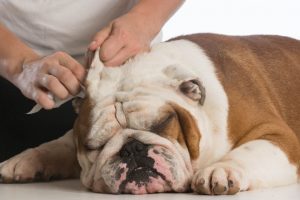
How to Clean an English Bulldog’s Ears
Regular ear cleaning is essential for preventing ear infections in English Bulldogs. Here’s a step-by-step guide to cleaning your English Bulldog’s ears:
- Gather supplies: You’ll need a cotton ball, ear cleaning solution, and treats to reward your pet.
- Hold your English Bulldog still: Have someone hold your dog still while you clean their ears to prevent them from shaking their head.
- Apply the cleaning solution: Pour a small amount of the ear cleaning solution into your dog’s ear.
- Massage the ear: Gently massage the base of your dog’s ear to help distribute the cleaning solution.
- Wipe away the excess: Use a cotton ball to wipe away any excess cleaning solution and debris from your dog’s ear.
- Repeat on the other ear: Repeat the process on the other ear.
- Reward your pet: Give your dog a treat as a reward for being cooperative during the ear cleaning process.
How to Treat a Dog Ear Infection at Home
- Clean Your Dog’s Ears: Use a veterinarian-approved ear cleaning solution to gently clean your dog’s ear. This can help remove debris and discharge and may provide some relief to your dog.
- Use a Warm Compress: Applying a warm, damp compress to your dog’s ear may help relieve some of the pain and inflammation associated with an ear infection. Use a clean cloth or towel and hold it against your dog’s ear for a few minutes at a time.
- Apply Medication: Your veterinarian may prescribe ear drops or other medication to treat your dog’s ear infection. Follow the instructions carefully, and be sure to administer the medication for the full duration prescribed, even if your dog’s symptoms improve.
- Use Natural Remedies: Some natural remedies may help reduce inflammation and provide some relief to your dog. For example, coconut oil has anti-inflammatory properties and can be used to help soothe your dog’s ears. You can also try a solution of equal parts apple cider vinegar and water to clean your dog’s ear.
What Are The Best Ear Cleaning Solutions For English Bulldogs?
As we already mentioned, regular ear cleaning is an important part of bulldog care. Using the right ear cleaning solution not only helps prevent infections but also keeps your dog comfortable and healthy.
Here are three excellent options designed specifically for English Bulldogs:
Ear Cleansing Solution for English Bulldogs
This gentle, pH-balanced formula effectively removes wax and debris without causing irritation. It’s suitable for regular maintenance and helps reduce the risk of ear infections when used consistently.
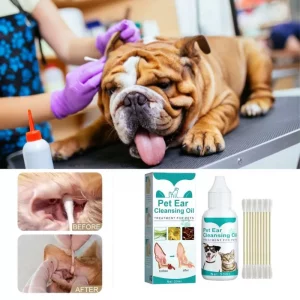
SPIRIT English Bulldog Ear Cleaner
Made with soothing ingredients such as aloe, this cleaner supports healthy skin while keeping ears free from build-up. It’s a great choice for routine cleaning and leaves ears feeling fresh without any sticky residue.

English Bulldog Ear Cleaning Solution
A reliable option for tackling wax build-up, this solution is especially useful after baths or swimming sessions. It helps keep ears dry, clean, and less prone to bacterial growth.
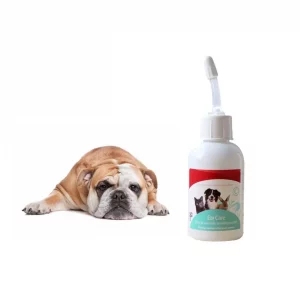
Why These Products Are a Smart Choice
Since English Bulldogs are more susceptible to ear infections than many other breeds, preventative care is key. These products are specifically designed with their needs in mind—balancing effectiveness with gentleness. Regular use can help minimize redness, odor, and head-shaking while promoting overall ear health.
Preventing English Bulldog Ear Infection: Wrapping Up
It’s important to note that while these home remedies may provide some temporary relief, they will not cure the infection entirely. In some cases, a dog ear infection can become quite serious, and without proper veterinary care, it can lead to more significant health issues. If you are unable to access veterinary care immediately, be sure to monitor your dog’s symptoms closely and seek veterinary attention as soon as possible.

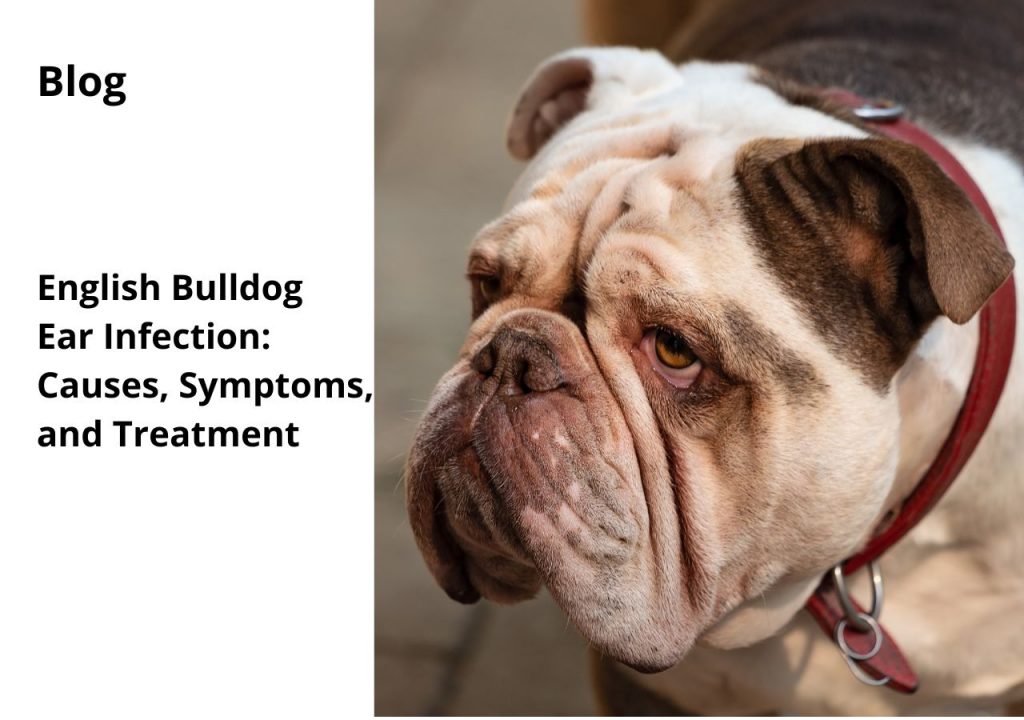

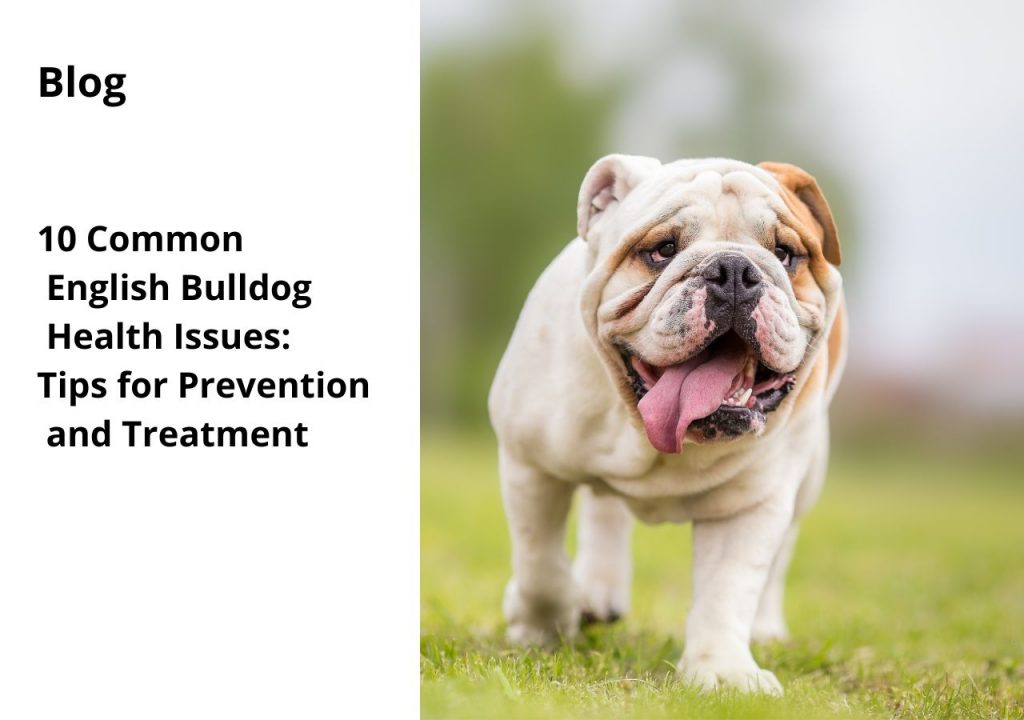
Pingback: Why does my English bulldog stink?